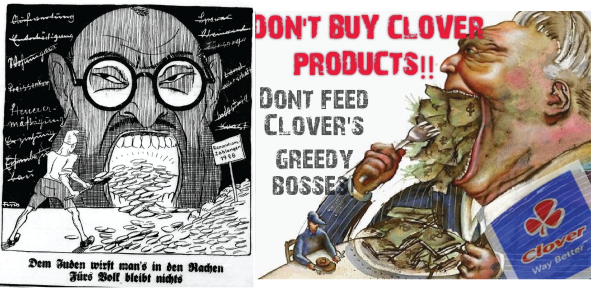“It doesn’t end with the Jews,” US antisemitism expert warns
17 November 2022
SA Jewish Report - World-renowned antisemitism expert Ambassador Deborah Lipstadt has confirmed that the cartoon that led to the SA Jewish Report leaving the South African Press Council was, without doubt, antisemitic.
The SA Jewish Report wrote about this cartoon after it was posted on the Facebook page of the South African Boycott, Divestment, Sanctions Coalition two years ago depicting a caricature captioned “Greedy Clover Bosses”.
The cartoon depicts a gluttonous, overweight man with a hook nose stuffing a pile of money into his mouth while a worker is drawn as a diminutive figure sitting in front of an empty plate.
It’s accompanied by the caption, “Greedy bosses connected to apartheid Israel. Blood curdling milk [and cheese, yoghurt, etc.]. Every reason to boycott Clover! Change your brand.”
At the time, South Africa’s largest dairy producer, Clover, had been bought by an Israeli consortium in a multi-billion rand investment deal.
This controversial cartoon led to the SA Jewish Report leaving the Press Council rather than apologising to the anti-Israel group for labelling the cartoon antisemitic, following instructions from the council to do so.
“Are Clover’s bosses Jewish? Then there’s no debate,” said Lipstadt, a historian and the United States special envoy to monitor and combat antisemitism, who was visiting South Africa last week. Lipstadt is professor of Modern Jewish History and Holocaust Studies at Emory University, has published multiple books on antisemitism and Holocaust denialism, and has devoted her life to fighting antisemitism and Holocaust denialism.
During her visit, Lipstadt, who is concerned about rising rates of antisemitism globally, met local Jewish communities, government officials, university students, scholars, and civil society representatives. She discussed actionable strategies and opportunities to work with them to counter antisemitism, as well as anti-Muslim hatred, racism, and other forms of intolerance and discrimination.
Without knowledge of the cartoon saga, a cursory glance at the offending cartoon elicited this response from the esteemed professor: “It certainly is a caricature. The stuffing of the mouth, the nose, the greediness, the jowls, are all traditional attributes used by antisemites, and then Clover has been bought by Israelis, so they’re greedy bosses. There’s no debate. If it had been bought by Italian mafioso, [it would have been different], but it’s been bought by Israelis, that closes the circle.”

Images: On the left is a cartoon from the notorious German anti-Semitic newspaper, Der Stürmer, from September 1928. On the right is the Clover cartoon.
On hearing about the SA Jewish Report’s refusal to apologise she said, “That’s guts, that’s standing up.”
She said the cartoon had echoes of an offensive mural featuring antisemitic tropes painted on a wall in London in 2012 by a US-based graffiti artist supported by former leader of the United Kingdom’s (UK’s) Labour Party, Jeremy Corbyn. Corbyn, who was accused many times of failing to act against antisemitism especially in connection to hatred of Israel, later conceded that he was wrong to support the antisemitic artwork. The saga was referred to in Lipstadt’s book, Antisemitism Here and Now.
The mural, which was subsequently scrubbed off, was titled Freedom for Humanity, and depicted a group of businessmen and bankers, some of them Jewish, counting money around a Monopoly-style board balanced on the naked, bowed backs of black workers.
Referring to the Clover cartoon, Lipstadt said, “It’s that kind of thing.”
In an interview with the SA Jewish Report at the Apartheid Museum last week, Lipstadt, who has visited the county four times before, this time in her new role representing the White House, said, “I’m not here to preach or wag a finger, I’m here to spread the message that it’s important to take the small things seriously. Words matter. Take antisemitism seriously because it’s a threat to democracy.
“Take this issue seriously. Recognise that something that starts with the Jews may not end with the Jews. There’s an interconnectedness of hatred. You cannot fight hatred and prejudice in silos. You can’t say, ‘I’m against only racism and antisemitism is fine with me, or vice versa’, because someone who hates one usually hates the other, and there’s a deep-seated connection.”
Lipstadt is arguably best known for the libel suit filed against her in the UK by Holocaust denier David Irving in 1996, whom she had called a Holocaust denier in her book, Denying the Holocaust. Lipstadt won the case in 2000. She went on to write a book about it, History on Trial, which was the basis of the 2016 film, Denial, starring Academy Award winner Rachel Weisz as Lipstadt.
The celebrated historian, who is single, told the SA Jewish Report that if she had young children at home, she didn’t know if she could have given up six years of her life and 12 weeks in London during the trial, thereafter contributing to the making of the movie. “Being single has made it easier to do what I do. I’ve found my calling in other ways.”
Asked why it was so important for governments to take antisemitism seriously, she said, “Antisemitism threatens democracy and a society which is based on tolerance. Antisemitism is a conspiracy theory which inculcates a lack of faith in democratic institutions – the media is no good as it is controlled by Jews, the banks are controlled by Jews, the government is controlled by Jews, so you end up not believing that your democracy works.”
“I’ve been told by many that actual acts of antisemitism in South Africa are quite low,” she said. “What has worried more people is rhetoric, whether it’s associated with Israel or other things. Bad things, including genocide, always begins with words and escalates from there. Part of what I’m here to say is, ‘Take the small things seriously, because the small things become big things.’”
The important thing is to get people to understand that antisemitism and attitudes towards Israel – criticism of Israel – are two separate things,” she said on the South African government’s stance. “Criticism of Israel isn’t necessarily antisemitic. It’s important to understand that antisemitism is a pernicious prejudice with terrible ramifications, and this isn’t just a matter of a particular position vis-à-vis Israel but is something that often morphs into antisemitism and uses antisemitic language.”
The negation of Jewish nationhood is a form of antisemitism, she writes in her book Antisemitism Here and Now. Though America hadn’t made overt efforts to encourage South Africa to accept the International Holocaust Remembrance Alliance’s non-legally binding working definition of antisemitism, she hoped South Africa would.
“It’s important to continue to speak up. You’re never in trouble if you stand up for truth,” Lipstadt said. “You may have a hard time, but in the end, you’ll be on the right side.”
Source: SAJR, 17 November 2022

